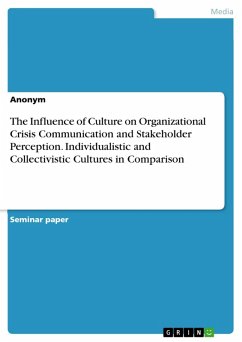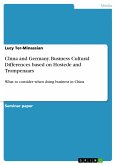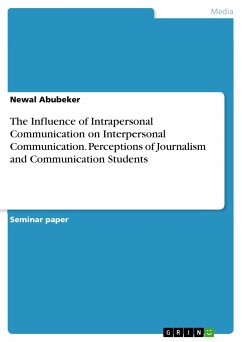Seminar paper from the year 2018 in the subject Communications - Intercultural Communication, grade: 1,0, Johannes Gutenberg University Mainz (Institut für Publizistik), language: English, abstract: Volkswagen emissions scandal, Germanwings Flight 9525, Samsung's exploding batteries - corporate crises are becoming more and more common in today's unpredictable environment. In the course of globalization, an increasing number of multinational organizations is operating in an international setting. Thus, the likelihood and potential impact of a corporate crisis rises. At the same time, the international potential of a crisis is aggravated by the dissemination of information in near real-time due to the Internet. Especially negative information spreads with a range and speed that increases an organization's vulnerability to crises. As a result, the demand and importance of crisis communication is leaping. Due to the more complex and international surroundings of crisis communication, culture as a contextual factor in crisis communication plays a role of growing importance. In different cultures, different crisis responses by the organizations are expected because stakeholders perceive and react to messages in different ways dependent upon their culture. The probably most typical distinction of cultures is between collectivistic and individualistic societies. In the past, crisis communication research has been given too little attention to cultural contexts. Crisis communication research and theories almost exclusively focused on individualistic Western contexts. However, the growing relevance of culture in crisis communication is getting more and more evident in research. For this reason, the question of the cultural influences of individualistic and collectivistic societies on organization's crisis communication strategies as well as the stakeholders' perception of and responses to the crisis messages in different cultural settings is discussed in the present work. To answer this question, first of all an overview of the theory of crisis communication is given, with reference to the definition and the main crisis communication theories and strategies. Secondly, the term culture is paid attention to, with a focus on the dimension of individualistic versus collectivistic cultures as an influencing factor on crisis communication. Subsequently, the current findings of the influence of individualism and collectivism on organizations' crisis communication strategies and on the perception of stakeholders are reflected. Concluding, the results are discussed in the overall setting, limitations are shown and implications for future research are given.
Dieser Download kann aus rechtlichen Gründen nur mit Rechnungsadresse in A, B, BG, CY, CZ, D, DK, EW, E, FIN, F, GR, HR, H, IRL, I, LT, L, LR, M, NL, PL, P, R, S, SLO, SK ausgeliefert werden.









